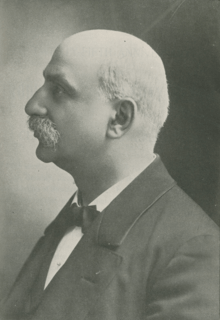Emil G. Hirsch
| Emil Gustav Hirsch | |
|---|---|
 | |
| Born |
May 22, 1851 (20 Iyar 5611) Luxembourg, Luxembourg |
| Died |
January 7, 1923 (aged 71) (19 Tevet 5683) United States |
| Education | University of Pennsylvania |
| Occupation | Reform rabbi |
| Spouse(s) | Daughter of David Einhorn |
| Parent(s) | Samuel Hirsch |
Emil Gustav Hirsch (May 22, 1851 – January 7, 1923) was a major Reform movement rabbi in the United States.
Biography
Emil Gustav Hirsch was born in Luxembourg, a son of the rabbi and philosopher Samuel Hirsch on May 22, 1851. He later married the daughter of Rabbi David Einhorn. He studied at the University of Pennsylvania, and in 1872 went to Berlin for post-graduate work. He was rabbi at Har Sinai Congregation in Baltimore (1877–78), and in Louisville, Kentucky, (1878–80). But he did his greatest work in Chicago.
For forty-two years (1880–1923), Hirsch served as the rabbi of Chicago Sinai Congregation, one of the oldest synagogues in the midwest. At this post, he became well known for an emphasis on social justice. From Chicago Sinai's pulpit, he delivered rousing sermons on the social ills of the day and many Chicagoans, Jew and gentile alike, were in attendance.
Appointed professor of rabbinical literature and philosophy at the University of Chicago in 1892, Hirsch also served on the Chicago Public Library board from 1885 to 1897. He took some part in politics as a member of the Republican Party.
He was an influential exponent of advanced thought and Reform Judaism. He edited Der Zeitgeist (Milwaukee) (1880–82) and the Reform Advocate (1891–1923). He also edited the Department of the Bible of the Jewish Encyclopedia and contributed feminist articles to The American Jewess. He also wrote studies of the historical relationship of Judaism and Christianity, including appreciations of its founding figures Jesus and Paul.[1]
Hirsch is the namesake of the Emil G. Hirsch Metropolitan High School of Communications, located in the Greater Grand Crossing neighborhood in Chicago. In keeping with his interest in education, Hirsch advised a wealthy congregant, Julius Rosenwald of Sears, Roebuck & Co., to use part of his wealth to help build public schools which black students could attend in the segregated south. The school building program was one of the largest programs, but not the only, administered by the Rosenwald Fund.
See also
References
- ↑ Langton, Daniel (2010). The Apostle Paul in the Jewish Imagination. Cambridge University Press. pp. 98–102.
Sources
- Chicago Portraits
 Gilman, D. C.; Thurston, H. T.; Colby, F. M., eds. (1905). "Hirsch, Emil Gustav". New International Encyclopedia (1st ed.). New York: Dodd, Mead.
Gilman, D. C.; Thurston, H. T.; Colby, F. M., eds. (1905). "Hirsch, Emil Gustav". New International Encyclopedia (1st ed.). New York: Dodd, Mead.- Brinkmann, Tobias (2012). Sundays at Sinai: A Jewish Congregation in Chicago. Chicago: University of Chicago Press. ISBN 9780226074542.
- Hirsch, Emil G. (April 1895). "The Modern Jewess". The American Jewess. 1 (1): 10–11.